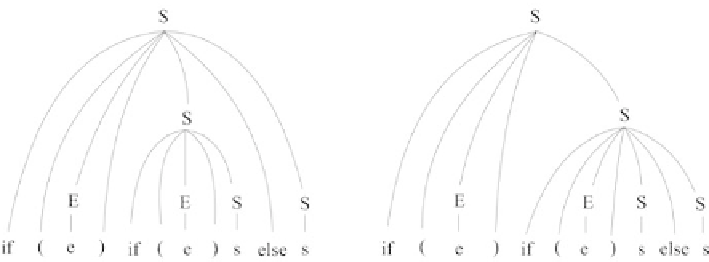Java Reference
In-Depth Information
or multiplication? From our math days, we would like the multiplication operator
*
to be
more binding than the addition operator
+
. Notice that the grammar in (3.11) does not
capture this precedence of operators in the way that the grammar in (3.9) does.
Example. As another example, consider the grammar describing conditional statements
S ::=
if(
E
)
S
j
if(
E
)
S
else
S
j
s
E ::=
e
(3.12)
Here, the token
e
represents an arbitrary expression and the
s
represents a (non-
conditional) statement.
Consider the sentence
if(e)if(e)selses
(3.13)
If we look at this sentence carefully, we see that it nests one conditional statement within
another. One might ask: To which
if
does the
else
belong? We cannot know; the sentence
is ambiguous. More formally, there exist two left-most derivations for this sentence:
S
)
if(
E
)
S
else
S
)
if(e)
S
else
S
)
if
(e)
if(
E
)
S
else
S
)
if
(e)
if(e)
S
else
S
)
if(e)if(e)selse
S
)
if(e)if(e)selses
and
S )
if(
E
)
S
)
if(e)
S
)
if(e)if(
E
)
S
else
S
)
if(e)if(e)
S
else
S
)
if(e)if(e)selse
S
)
if(e)if(e)selses
The two differing parse trees in Figure 3.4 for the same sentence (3.13) also demonstrate
ambiguity.
FIGURE 3.4 Two parse trees for
if(e)if(e)selses
.












Search WWH ::

Custom Search